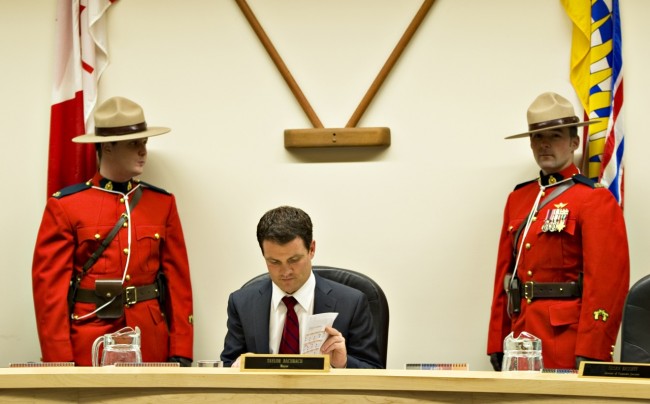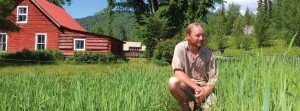
Something to tweet about: Young politicians rise into the ranks in northern BC
According to a report published online by Initiatives Prince George, the most rapidly expanding age demographic in northern BC is the 60-and-overs—but you wouldn’t know it from our municipal politics.
Several towns saw a shakeup in the recent elections, which included higher voter turnouts and younger candidates elected. A few themes emerged. Firstly, politicians can no longer ignore social media. Secondly, there’s a younger generation looking to transcend traditional social boundaries. Finally, if you’re not willing to hear from your constituents—they don’t want to hear from you.
On Nov. 19, Burns Lake voters opted to elect the youngest mayor in BC history (and the second youngest in Canada). Dawson Creek’s youngest-ever councillor tied the provincial record. A rookie mayor and a rookie councillor, in Smithers and Houston respectively, credit election excitement to new candidates, fresh perspectives and a resurgence in municipal politics across the North.
Are increased voter turnout and generally younger councils signaling change for the region?
“The last two elections we’ve seen a lot of new faces,” says Jonathan Van Barneveld, 22, who gained a seat on Houston council. He credits the relatively high 40-percent voter turnout to a new slate of candidates—in a community where municipal seats are often won by acclamation. He says although about 30 people have shown up to past debates, the recent election saw over 150 people attending.
“People are interested. It’s almost like a critical mass,” he says.
A recent grad from UNBC, where he served as president for the Young New Democrats, Van Barneveld ran as an NDP candidate in last May’s federal election. He returned to his hometown Houston for a forestry job and decided to run for council.
He says there’s no doubt the recent election brought a shift to younger municipal representation. “I think the majority of our council is under 45-ish. That’s not terribly young, but it is compared to what we’re used to, which is over 45-ish.” At 22, Van Barneveld is the youngest councillor Houston has seen. He reached a diversity of voters through Facebook, Remembrance Day ceremonies and door-knocking.
Towns as leaders
While Houston’s election focused on municipal concerns—healthcare, water quality, economic diversification and developing recreation and tourism—just an hour west down-valley candidates took on a larger-scale issue: Their stance on the proposed Enbridge pipeline.
“We’ve shifted to a place where we think about municipal government in fairly narrow terms—that municipal government is about providing basic infrastructure to support the community,” says Smithers mayor Taylor Bachrach, who beat out incumbent Cress Farrow 896 to 635. “I think there are a bunch of issues that the municipality can take a leadership role on and that hasn’t taken place to the extent they want it.”
The previous council irked some residents with its refusal to take a stance on the controversial pipeline. When asked at an all-candidates’ forum about his position, Bachrach didn’t hesitate to state his opposition.
“I think people are keen to have more communication with their local government,” says Bachrach. The 33-year-old communications specialist used social media to reach the public, noting that Facebook in particular gave constituents the opportunity to ask questions and get almost immediate responses.
“We tried to use some different tools. We really tried to be out there communicating with people and building a movement around progressive politics,” he says. In a province where average voter turnout was slightly less than 30 percent, Smithers’ was more than 66 percent.
“What we succeeded in doing is tapping into something that’s already there,” he says. “People were excited about something new. They were excited about the idea of having something different in terms of leadership. You could definitely feel that. It was palpable.”
Youngest BC mayor
In Burns Lake, where voter turnout was more than 42 percent, Luke Strimbold landed himself the mayor’s seat with 325 votes, compared with Eileen Benedict’s 186 and Jim Minger’s 52. The 21-year-old is the second-youngest mayor ever elected in Canada (the youngest being Clayton Smith, who was elected mayor in New Norway, Alberta at age 19).
Despite his age, Strimbold comes to the mayor’s seat with some experience. Before council he worked with the local riding association as a youth rep and won a council seat in a 2010 by-election. He doesn’t mind the attention brought to his age—it gives him a chance to talk about his passion for politics and why he’s running for municipal government. And that, he says, makes him happy.
“It’s one of the areas where you can definitely have some influence. You get to meet some great people,” he says. He estimates the new council is all under 50, which provides new perspectives and ideas. “People who have been involved for years, they have a great knowledge background, but we all become harder to change.”
Having a younger council also provides a clean slate, he says, adding that one of his biggest priorities is building relationships with First Nations.
“There are things that have been done in the past and as young people we weren’t involved in the past,” Strimbold says. “We look at it as, OK, this isn’t right. We look at it in a new way: Let’s look at this relationship so this doesn’t happen again.”
Being tech savvy was also a benefit. Strimbold used the Internet to reach voters and continues using it to keep in touch with community.
“It’s a great access to get broad perspectives and broad outreach,” he says. In Burns Lake, along with healthcare and infrastructure, one of the biggest issues was government transparency. “If you don’t have public engagement and support, you aren’t making effective decisions.”
The school of municipal politics
Elected in Dawson Creek, where he was born and raised, Duncan Malkinson says people expected him to use social media more in the recent election, but he found what worked best was good old-fashioned door-knocking: “I tried to hit every neighbourhood and meet as many people as possible,” he says. His strategy was successful: At age 18, Malkinson is tied for youngest councillor ever elected in BC.
Malkinson’s interest in politics started with a mock federal election in school. This past spring, he was voted valedictorian for his class. He says running for council encouraged his peers to get involved in the election.
“Everybody my age asks me, ‘What are you doing to do if you get on council?’ That just gets you going on all the issues right there,” he says. “It’s pretty important. There’s a lot of people who aren’t represented, not necessarily because of disinterest.”
Having recently graduated from high school, he is considering courses at the local college, but will otherwise put off post-secondary school for the time being. In the meantime, he says, he’s learning a lot about finances and the political process.
“It’s a bit of a head spin, getting into council. You find out things aren’t exactly the way you thought they were,” he says.
According to Initiatives Prince George, 76.3 percent of northern BC’s growth over the next two decades will take place in the 60-plus demographic, with declines expected in both the 0-19 and 40-59 age categories; the 20-39 category is expected to grow by only 0.6 percent.
If it’s true, the growing number of retirees might want to find their way onto Facebook and Twitter to engage with local politicians.



